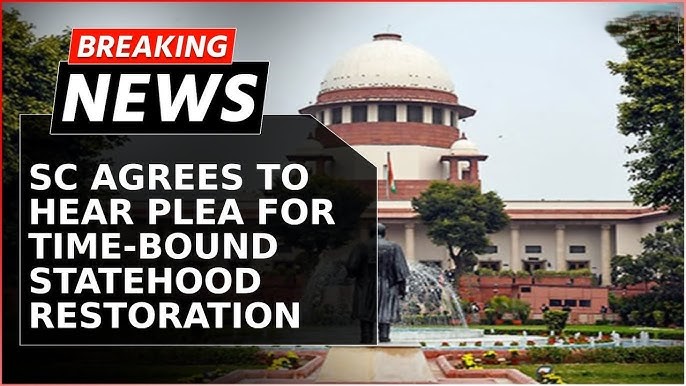Democracy on Trial: Petitioners Demand Time-Bound Statehood for Jammu & Kashmir
By: Javid Amin | New Delhi | August 14, 2025
The Supreme Court today heard a high-stakes plea demanding that the Union government restore statehood to Jammu & Kashmir within two months, intensifying pressure on the Centre over its slow follow-up to the 2019 constitutional changes. The case, which touches on core questions of federalism, democratic rights, and the limits of central authority, could reshape the political landscape of the Union Territory.
The Case at Hand
The petition, filed jointly by academician Zahoor Ahmad Bhat and activist Khurshaid Ahmad Malik, seeks time-bound directions for the restoration of J&K’s statehood — a promise the Centre has reiterated since 2019 but has yet to deliver on.
The petitioners argue that keeping J&K under Union Territory (UT) status for nearly five years:
-
Violates India’s federal structure, which is part of the Constitution’s basic framework.
-
Undermines democratic rights and local governance.
-
Contradicts Supreme Court’s own directive issued in December 2023.
Bench Composition
The matter is being heard by a two-judge bench:
-
Chief Justice B R Gavai
-
Justice K Vinod Chandran
Background: From Article 370 to the Present
On August 5, 2019, Parliament abrogated Article 370, revoking J&K’s special constitutional status, and bifurcated the state into:
-
Union Territory of Jammu & Kashmir (with a legislature)
-
Union Territory of Ladakh (without a legislature)
This was followed by the Jammu & Kashmir Reorganisation Act, 2019, which drastically altered governance structures.
In its December 11, 2023 judgment, the Supreme Court upheld the 2019 changes but:
-
Directed Assembly elections be held by September 2024.
-
Ordered that statehood be restored “at the earliest”.
The Assembly elections were held in Sept–Oct 2024, with results declared on October 8, 2024, and were widely hailed as peaceful. This, the petitioners say, removes the Centre’s last stated reason — security — for delaying statehood.
Petitioners’ Core Arguments (Presented Today)
01. Violation of Federalism
The petitioners contended that prolonged UT status undermines federalism, a core element of the Constitution’s basic structure. They argued that J&K’s continued governance under a centrally appointed Lieutenant Governor erodes the principle of state autonomy.
02. Breach of Supreme Court Directive
The Centre’s inaction, despite the Court’s 2023 order to restore statehood “at the earliest”, was described as a clear breach of judicial directions.
03. Peaceful Elections as Proof of Readiness
Both the 2024 Assembly elections and the Lok Sabha polls earlier this year were conducted peacefully — a fact the petitioners said proves that law-and-order concerns no longer justify postponement.
04. Democratic Deficit
J&K has operated as a UT for nearly five years, during which legislative and policy powers have been concentrated in New Delhi. This, the petitioners argued, has led to a reduction in democratic representation and decision-making at the local level.
05. No Precedent for Downgrading a State
The petitioners stressed that no Indian state has ever been downgraded to a UT without a constitutional amendment, calling J&K’s case a retrogression of democratic governance.
06. Honour Past Assurances
The Centre’s own legal representative, Solicitor General Tushar Mehta, had previously told the Court that UT status was temporary and statehood — excluding Ladakh — would be restored. The petitioners now demand a fixed two-month deadline for fulfilment.
Centre’s Earlier Stand
In prior hearings, the Centre has maintained that statehood will be restored, but without committing to a timeline. The argument has rested primarily on:
-
Security concerns in certain areas.
-
The need for administrative stability post-elections.
However, the assurance of temporariness has been a consistent line from the Union government since 2019.
Potential Implications of the Verdict
If the Supreme Court accepts the petitioners’ demand for a time-bound restoration, it could:
-
Force the Centre to fast-track the legislative process to reconstitute J&K as a state.
-
Set a constitutional precedent limiting how long a state can be kept under UT status after reorganisation.
If the Court declines to impose a deadline:
-
The Centre may retain flexibility to restore statehood on its own political and administrative timeline.
-
Critics may view it as judicial endorsement of prolonged central control.
What Happens Next
The bench is expected to reserve its order or schedule further hearings after today’s arguments. Any direction from the Supreme Court will carry enormous political weight, especially with the growing public and regional demand for a return to full-fledged statehood.
For now, the people of Jammu & Kashmir await not just the Court’s decision, but the answer to a larger question: How long can democracy in a former state remain in “waiting room” status?


